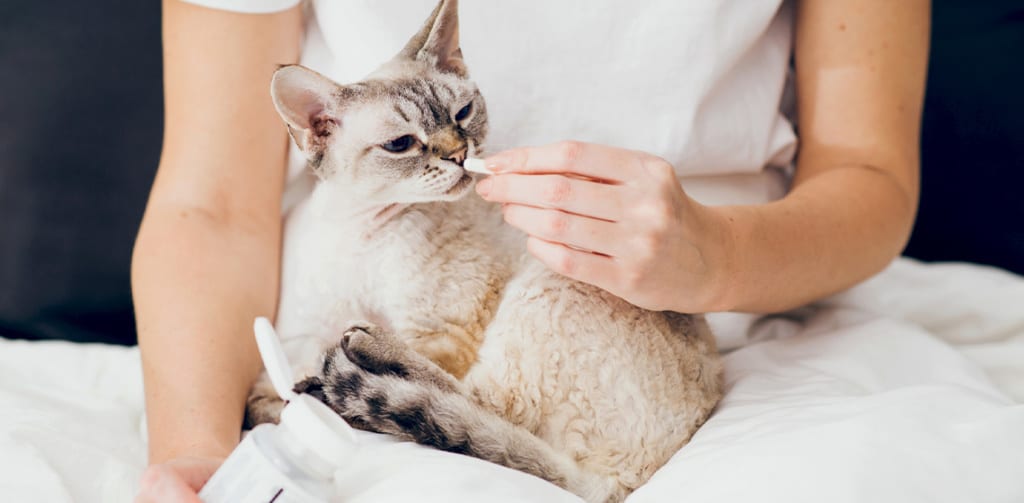Many of the health-conscious masses take probiotics as part of their daily routine. In people, probiotics can help improve digestion and reduce gut symptoms like bloating and discomfort, diarrhea, indigestion, and constipation. Good gut health is vital for a good immune system and better general health, so is it the same for cats?
Table of Contents
What are probiotics?
We all have good bacteria living within our gut, called our microbiome, and cats are no different. However, like no two people’s microbiomes are the same, the bacteria within each cat’s microbiome will also vary. The balance of bacteria within the microbiome is critical because keeping bad bacteria numbers down helps prevent infections and reduce unpleasant or uncomfortable gut symptoms.
It’s the job of the probiotic to replace the healthy bacteria in the gut, which can dwindle if we are run down or suffering from illness, stress, or poor lifestyle choices. Medications like antibiotics can also upset the bacteria balance in the microbiome. Probiotics for humans are available as live yogurt drinks, tablets, pastes, and powders. However, the key to an effective probiotic formula is ensuring that the good bacteria are still alive when they reach their new home in the gut.
Cat probiotics can help to keep your purry pet’s troublesome gut symptoms under control, and veterinarians certainly recommend them as a way to boost your cat’s overall health.
What are the potential benefits of cat probiotics?
Cats are just like us; they have live bacteria within their guts, some good and some bad. Cats with a healthy gut will have the right balance of good and bad bacteria, giving them a barrier against infection and keeping them free from nasty symptoms like gas, bloating, and diarrhea. So, if your cat’s levels of good bacteria start to drop due to illness, stress, or a bad diet, you’d ideally want to replace them. Replacing them will restore the balance of their microbiome, and the best way to achieve this quickly is by using a probiotic.
Like the human versions, cat probiotics are available in a few different formulations. But remember, don’t just choose a particular probiotic because it sounds easiest to give to your mischievous moggy. Some types will be better than others at getting live bacteria into your cat’s gut intact. The same goes for using human probiotics – cats’ diets are very different from ours, mainly consisting of meat protein, so their microbiome is also very different. It might be easier to reach for a probiotic you already have at home, but choosing a cat probiotic will be much more effective and ultimately safer.
It’s essential to get your cat checked by a veterinarian if they are unwell before trying a probiotic at home.
Are there any risks when it comes to cat probiotics?
Perhaps the main risk of giving your cat a probiotic is nothing to do with the probiotic at all. In having the option to try a probiotic when your cat has diarrhea, constipation, vomiting, bloating, or reduced appetite, you might choose the probiotic over seeking veterinary advice. Of course, many mild gut upsets will respond well to a probiotic restoring some normality.
However, it’s vitally important not to delay veterinary treatment in favor of trying a probiotic first if your cat has more severe symptoms or is acting unwell. Instead, book your cat an appointment for a vet check, and get the go-ahead from your veterinarian before starting any new medication or supplement.
Other, more minor concerns are due to the fact that many cat probiotics and other pet supplements are not currently regulated. This means that, although it’s unlikely that a probiotic would be dangerous for your cat, the product might not be as effective as it claims to be. So, speak to your veterinarian if you want advice on which cat probiotics are most likely to work for your feline friend.
Summary
Cat probiotics have a place in improving your cat’s general health by protecting them against illness and infection as well as reducing gut symptoms like diarrhea and bloating. You should speak to your veterinarian and do some research to help you choose a product that’s likely to be effective. But, if your pet is unwell, it’s always best to get them an appointment with a veterinarian before trialing treatment at home. That way, you can make sure they are back to full health as soon as possible.
FAQ
Cat probiotics can help to keep your purry pet’s troublesome gut symptoms under control, and veterinarians certainly recommend them as a way to boost your cat’s overall health. However, it’s essential to get your cat checked by a veterinarian if they are unwell before trying a probiotic at home. The probiotic might not fix the problem, and your cat could get worse in the time that you wait before visiting the vet.
Too much probiotic may cause your cat to get diarrhea, or the opposite – they might become constipated. It’s always worth sticking to the guidelines on the leaflet insert. If you are worried that you have given your cat too much probiotic and they are unwell, you should contact a veterinarian.
Diarrhea can be due to a lack of good bacteria in the gut, but it can also cause a reduction in the number of good bacteria. So, in some cases of diarrhea, probiotics can help, and in other cases, probiotics are helpful after treatment of diarrhea to restore the good bacteria. It’s important to be aware, though, that many causes of diarrhea won’t respond to probiotics and will need specific treatment, so contact your veterinarian if you are concerned.
Cats rely on their gut flora for immunity and the prevention of diarrhea, gas, vomiting, and other gut symptoms, just like humans do. However, the concept of probiotics in pets is relatively new compared to its long-term recognition in humans. If your cat is prone to having loose stools, gas, or belly pain, and your veterinarian has ruled out any serious underlying causes, it’s worth considering adding a probiotic into your cat’s health routine.

Dr. Hannah Godfrey MRCVS graduated from the Royal Veterinary College in 2011. Although she initially worked in mixed practice treating all species, she found a love for small animal work and has worked exclusively with dogs and cats since 2014. She lives in Wales with her partner, son, and two cats (named Poppy and Ashton Kutcher), and writes comedy fiction in her spare time.








